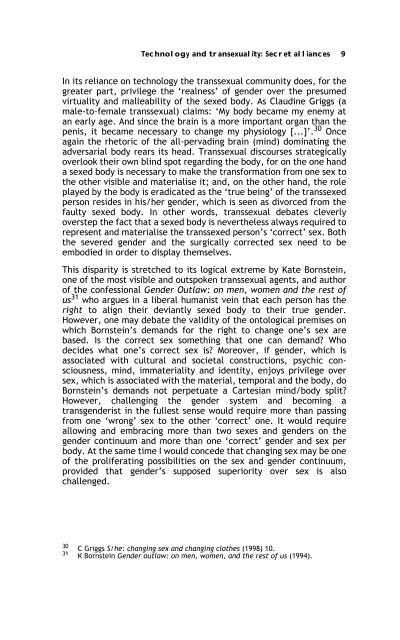Sex, Gender, Becoming - PULP
Sex, Gender, Becoming - PULP
Sex, Gender, Becoming - PULP
Create successful ePaper yourself
Turn your PDF publications into a flip-book with our unique Google optimized e-Paper software.
Technology and transexuality: Secret alliances 9<br />
In its reliance on technology the transsexual community does, for the<br />
greater part, privilege the ‘realness’ of gender over the presumed<br />
virtuality and malleability of the sexed body. As Claudine Griggs (a<br />
male-to-female transsexual) claims: ‘My body became my enemy at<br />
an early age. And since the brain is a more important organ than the<br />
penis, it became necessary to change my physiology [...]’. 30 Once<br />
again the rhetoric of the all-pervading brain (mind) dominating the<br />
adversarial body rears its head. Transsexual discourses strategically<br />
overlook their own blind spot regarding the body, for on the one hand<br />
a sexed body is necessary to make the transformation from one sex to<br />
the other visible and materialise it; and, on the other hand, the role<br />
played by the body is eradicated as the ‘true being’ of the transsexed<br />
person resides in his/her gender, which is seen as divorced from the<br />
faulty sexed body. In other words, transsexual debates cleverly<br />
overstep the fact that a sexed body is nevertheless always required to<br />
represent and materialise the transsexed person’s ‘correct’ sex. Both<br />
the severed gender and the surgically corrected sex need to be<br />
embodied in order to display themselves.<br />
This disparity is stretched to its logical extreme by Kate Bornstein,<br />
one of the most visible and outspoken transsexual agents, and author<br />
of the confessional <strong>Gender</strong> Outlaw: on men, women and the rest of<br />
us 31 who argues in a liberal humanist vein that each person has the<br />
right to align their deviantly sexed body to their true gender.<br />
However, one may debate the validity of the ontological premises on<br />
which Bornstein’s demands for the right to change one’s sex are<br />
based. Is the correct sex something that one can demand? Who<br />
decides what one’s correct sex is? Moreover, if gender, which is<br />
associated with cultural and societal constructions, psychic consciousness,<br />
mind, immateriality and identity, enjoys privilege over<br />
sex, which is associated with the material, temporal and the body, do<br />
Bornstein’s demands not perpetuate a Cartesian mind/body split?<br />
However, challenging the gender system and becoming a<br />
transgenderist in the fullest sense would require more than passing<br />
from one ‘wrong’ sex to the other ‘correct’ one. It would require<br />
allowing and embracing more than two sexes and genders on the<br />
gender continuum and more than one ‘correct’ gender and sex per<br />
body. At the same time I would concede that changing sex may be one<br />
of the proliferating possibilities on the sex and gender continuum,<br />
provided that gender’s supposed superiority over sex is also<br />
challenged.<br />
30<br />
C Griggs S/he: changing sex and changing clothes (1998) 10.<br />
31 K Bornstein <strong>Gender</strong> outlaw: on men, women, and the rest of us (1994).
















